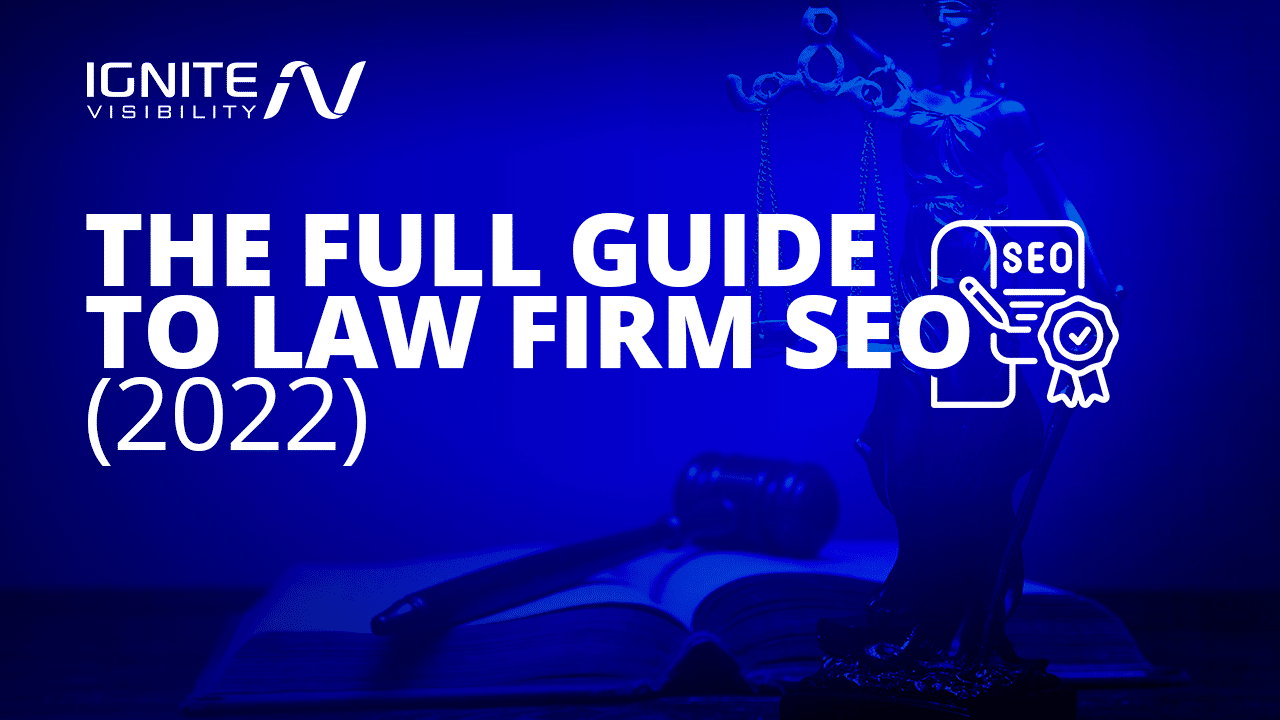
With law’s high average client value, SEO is even more important than other industries. Even low-volume keywords can pay off if the searcher is looking to spend a lot on legal services.
So in this article, you’ll learn everything about SEO for law firms—what it is, why it matters, and how to master it. Plus, we’ll answer common law firm SEO questions at the end.
What You’ll Learn:
- Why law firm SEO matters
- How it differs from traditional SEO
- How local SEO affects legal SEO
- The importance of titles
- How graphics benefit legal websites
- How to use structured data to increase visibility in the SERPs
- How reviews affect your law firm’s rank
- How Google’s latest changes impact it
- How to use video to effectively market your firm
- FAQ
Why Law Firm SEO Matters
Search engines are the main way people research online—including legal research. In fact, Google handles over 90% of all web traffic worldwide.
Effective SEO gives you a consistent presence in that traffic, guaranteeing you a steady stream of valuable leads. That’s why 79% of local businesses rate SEO as their most effective channel.
How it Differs From Traditional SEO
Legal marketing is fiercely competitive, even compared to other sectors. Buying PPC ads for terms like “personal injury lawyer” can cost over $200 per click—a price unheard of in other industries.
SEO lets you rank organically for ultra-competitive terms, getting free traffic other firms to pay tens of thousands for every month.
But the value of those keywords comes with increased competition. In all likelihood, you’re competing with dozens—if not hundreds—of competing firms in your area.
If you’re new to SEO, you may not understand the investment required to rank for highly competitive legal terms. You can’t just make a website, write some blogs, and watch the leads roll in.
Legal SEO is a long-term commitment to creating top-quality content backed by authoritative links. It means A/B testing, hiring premium copy and content writers, building hundreds of client reviews, and more.
But in the end, you get an established presence paid ads could never give you. The rankings, backlinks, and presence you build are lasting, reaping benefits years into the future.
Why Local SEO is Crucial for Law Firms
More than a third of organic search traffic for all location-based businesses is local. And since most people don’t hire lawyers outside of their area, local search is even more important for law firms.
That’s why search engines heavily factor in location when people look for local businesses. For instance, here’s a search for “car accident lawyer” in Raleigh, North Carolina.
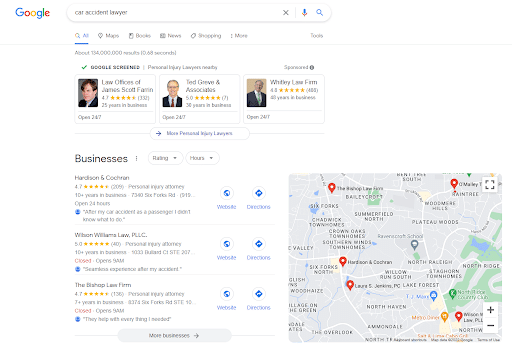
And here’s the same search in Los Angeles, California:
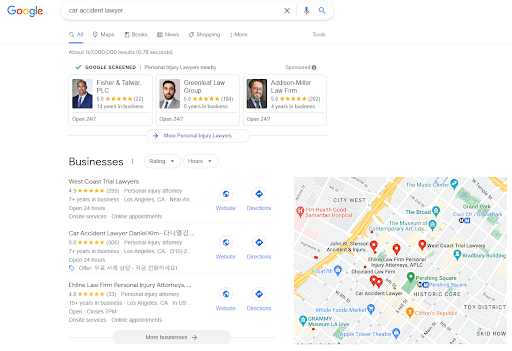
As you can see, a lawyer in LA has no chance of ranking in Raleigh, and vice versa.
Local SEO, of course, presents search results based on broad match terms and location, rather than longtail keywords.
That said, it’s not just local that law firms need to think about. There is also a huge opportunity to capitalize on niche keywords, like those listed here.
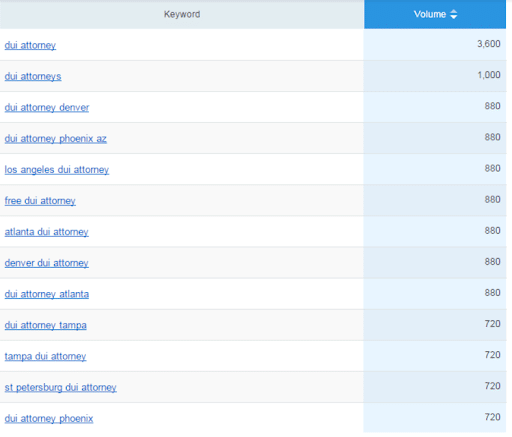
Beyond that, law firms can also build a reputation by creating content that answers questions and educates the public. This is one of the many tips that will pay off in the long run.
So, while getting new clients is likely going to be the main goal of your strategy, targeting general search terms is a worthwhile secondary goal, as it will help you build a reputation as an expert in your field.
Build out your content strategy by listing your firm’s practice areas and create categories where you can create high-quality content. Some ideas include the following:
- How-to guides
- Blog posts on key topics for your target audience
- Answers to FAQs
- Locally-focused content
- Articles that break down technical topics and make them more accessible
Essential Local SEO Strategies for Law Firms
Next, we’ll outline key strategies for maximizing your firm’s local SEO presence.
Create Your Google Business Profile
Google Business (formerly “Google My Business”) is a profile system that lets you list your firm in the Google ecosystem and control how it appears. It lets you get reviews, post updates, list services, receive messages, and more.
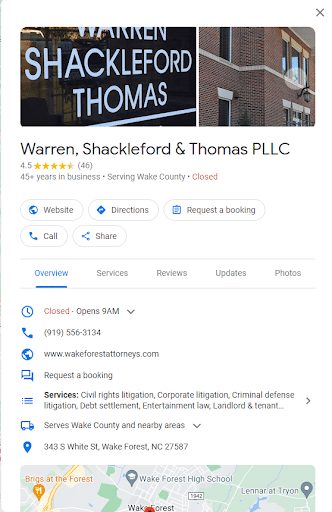
Its main impact is that your firm appears on Google maps, but it affects your search appearance too. In this Google search for “law firms,” business profiles are the first to appear:
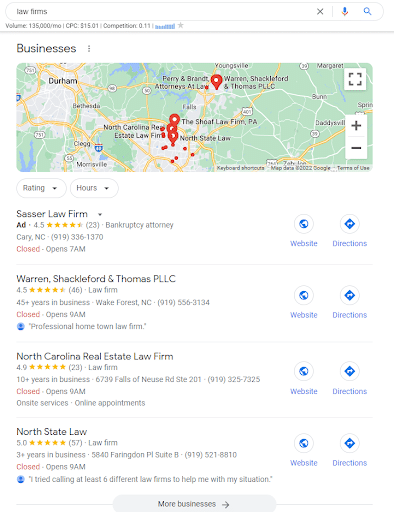
These powerful benefits make a Google Business profile mandatory for any serious local SEO strategy. If you don’t have one, you can’t appear on Google Maps or in business profile results as shown above.
If you don’t have a profile, creating one is easy.
First, sign in to the Google account you want to be associated with your business profile. Then, go to the Google Business homepage and click “manage now.”

From there, follow the on-screen instructions to fill out and verify your profile. Enter all the details you can since a profile’s completeness directly affects its ranking.
Update Your Directory Listings
While we’re on the topic of local law firm SEO, you’ll want to make sure all listings are consistent across the web. Business name, address, and phone number (NAP) should be the same on not only GMB, but your website, review sites like Yelp or Avvo, and even old school directories like the White Pages.
Citations seem like a small detail, but they matter because that multi-touch point consistency creates trust and authority with your audience. And, of course, NAP citations are a ranking signal that Google uses when determining which businesses go to the top of the results list.
You should obviously include your NAP in any law firm or business directories online. Pay particular attention to directories relevant to your expertise (for example, a nationwide directory of patent attorneys).
You can also add citations on other online properties as well. If you write a blog post for another site, be sure to include your NAP at the bottom of the post.
Add a Map to Your Site
Again, the more information you can provide to Google, the better.
To boost your law firm website SEO, add a Google map to your “About Us” or “Contact Us” page to further reinforce your appearance in the local search results.
Luckily, this is one of those low-hanging SEO fruits. All you’ll need to do is head over to Google Maps, navigate to your location, and click “Share or Embed map” from the menu in the top left corner and select “Embed map.” From there, you can choose a size and paste the code in the back end of your website. This will really help boost your results.
Work Towards a Knowledge Panel
Knowledge panels are the info boxes appearing on Google when searching for certain places, people, organizations, or topics. They give searchers more context for their query based on Google’s knowledge base.
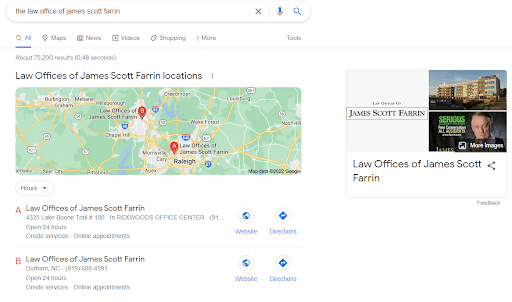
These aren’t to be confused with business profiles, which often appear in the same place as knowledge panels.
Google only gives knowledge panels to brands (or firms, in this case) with extensive brand authority. You have no ability to create a knowledge panel—Google creates one if it feels your business is significant enough.
For example, the firm featured above is nationally recognized, has been in business over 25 years, and has over 1,000+ reviews across all its offices.
But don’t worry if you don’t qualify (and you probably don’t). A fully-fleshed Business profile with many reviews can be even more authoritative than a knowledge panel.
Get Featured Snippets
Featured snippets are the highlighted text at the top of Google search results. They give users quick answers to their search without having to click on a site (though it’s available if the reader wants further context).
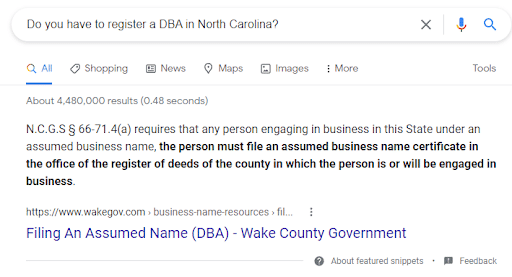
Featured snippets mainly appear for informational queries, so you’re not likely to get one for “best lawyer” or “lawyer near me.” That said, they can still be powerful lead gen tools.
To illustrate, imagine a reader places a search for “how to create an LLC in California.” If your firm’s article gets the snippet, they’ll likely click on your article.
When they read your page, you can plug your LLC creation service in, possibly turning them into a client. Scale that possibility to thousands of visitors, and a featured snippet is a lead-gen machine.
How to Get Featured Snippets
There are two core factors for getting a query’s snippet:
- Quality of the answer provided
- Number of backlinks your page has
Provide the most succinct, thorough answer out of every other search result. Then, get as many quality backlinks to your page as possible.
Crucial Legal SEO Ranking Factors
When it comes to ranking in the legal world, these factors are non-negotiable:
Title Tags
Title tags are HTML code assigning each page a title. They’re the page titles that usually appear in search results (more on that later).

Both Google and users use these titles to decide what your page is about, making it a crucial ranking factor. If your title tags aren’t optimized for the words you’re targeting, you have zero chance of ranking for them.
But don’t worry—optimizing your title tags for keywords is as simple as making sure the keyword exists in the title. Most headline optimization revolves around improving CTR, which is psychological, not technical.
Focus on standing out to get the most clicks. For example, our Amazon FBA article breaks the mold by taking an opinionated stance rather than fence-sitting like other pages.

This helped us rank page one for the term, despite the article being barely a month old.
Bonus: notice the highlighted text, “FBA is as valuable as ever.” This is our Google-detected answer to the question, “Is FBA worth it?”
If our page ranks high enough, Google will use this answer as the featured snippet. Your firm can do the same thing for almost any legal question.
Google Title Tag Changes
The reason we said HTML tags “usually” appear in search results is that Google sometimes changes them. Since 2021’s Page Title Update, Google began improving low-quality titles to boost user experience.
Google may change your tag if your title is:
- Too long
- Keyword-stuffed (keyword present too many times in an attempt to manipulate results)
- Lacking a title tag entirely or using something too generic like “Legal”
While tag changes won’t affect rankings, they can affect CTR (positively or negatively). To prevent any uncertainty, make your titles as clear and succinct as possible.
Keywords
Keywords are the phrases and words people type into search engines. Effective SEO depends on detailed keyword research—carefully deciding what keywords to target with your content.
For example, say you wanted to increase inbound organic leads on your firm’s website. You would pick keywords relating to your firm’s specialties and target them with search-optimized pages (landing pages, blog posts, etc.).
But how do you know what keywords to target? By using keyword research tools, which give detailed information about each keyword.
To illustrate, imagine you’re a firm in San Diego that wants to boost traffic fast. You’d use a tool like Ahrefs to search for a term like “immigration lawyer San Diego.”
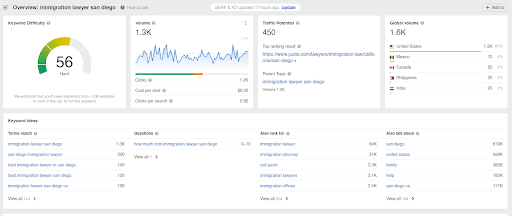
This data tells you it’s a valuable keyword (see the $8 CPC) but it’s hugely competitive. Ranking for this term might take years, which is incompatible with your goal of boosting traffic fast.
So instead, you find an easier variation, like “San Diego immigration lawyer free consultation.”
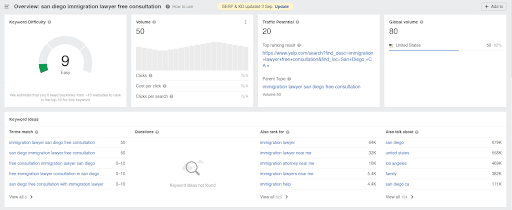
As you can see, this term is much easier to rank for. The right page would probably rank you on page one easily, potentially getting you dozens of leads each month.
BacklinksTechnical
Backlinks are links to your site from other websites. Each one acts as a vote of confidence for your site, like ballots in an election.
Specifically, search engines consider backlinks as a sign of a high-quality website. After all, only great content will make people refer to your site.
How to Get Backlinks
Backlinks are naturally obtained by creating high-quality content that other people reference. For instance, if you write a detailed article on tort law, others may reference it and link to it.
But natural link building takes time, and it can be a slog in the beginning. To build links faster, use these strategies:
- Guest posting. Guest posting is writing “free” blog content for other sites in exchange for a backlink. This is generally the easiest way to get high-quality links.
- Broken link fixing. Use SEO tools to find sites in your niche with links that 404. Offer to replace the broken links with suitable resources of your own.
- Graphic sharing. Create original graphics for your content (more on this below) and share them with other sites. If they think it will help their readers, they’ll use it and link back to your page.
- Just asking. You can reach out to other sites and simply ask them to link to your content. Know that this is saturated and often annoying, so try something like the above that gives value to the site.
Remember that backlinks are worthless if they don’t come from sites in your niche. Cooking, traveling, and beauty blogs won’t do anything for your firm’s site, no matter their reputation.

Technical SEO
Technical SEO is optimizing your site’s backend to appeal more to search engines. While your visitors won’t notice all of these tweaks, they make a huge difference in your rankings.
Here’s what you need to optimize for technical SEO:
Mobile-Friendliness
Mobile devices make up almost 60% of all web traffic. If your site is slow or unstable on mobile, you’re turning away over half of your potential leads.
Google hates mobile issues, too—it made mobile-friendliness a ranking factor in 2015. Each page should have a mobile design, with easy-to-find links and a streamlined menu.
Site Speed
Both users and search engines want sites to load quickly (3-4 seconds at most). Ensure your web host, content management system (WordPress, Wix, etc.), and page code isn’t bloating your site.
You can use free tools like Pagespeed Insights and GTMetrix to test your site speed. And if you’re on WordPress, plugins like WP Rocket can do much of the tweaking for you.
Secure Socket Layer (SSL)
SSL is an encryption protocol protecting the data sent between browsers and the servers they’re contacting. All modern browsers display a site’s SSL status in the form of a lock to the left of the URL.
In 2014, Google made SSL status a direct ranking factor. Many browsers warn users when a site is unsecured, making yours look unprofessional and dangerous without SSL.
SSL is incredibly easy to install. It’s usually free or cheap from servers and domain providers, and they’ll install it for you.
XML Sitemaps
An XML sitemap acts as a roadmap for search engine crawlers. They use it to know:
- All the pages on your site
- Date of publication/last update
Streamlined CMSs like Wix and Squarespace will build sitemaps by default. WordPress just needs an SEO plugin like Yoast or Rankmath.
How Graphics Benefit Legal Websites
Custom graphics provide immense value to your site’s visitors by explaining concepts in a visual format.
But most legal sites’ pages are just blocks of text without any visuals to explain things. By making graphics that present your ideas clearly, your content stands out.
Graphics aren’t hard to make either—design software like Canva makes it easy to create high-quality images including:
- Infographics
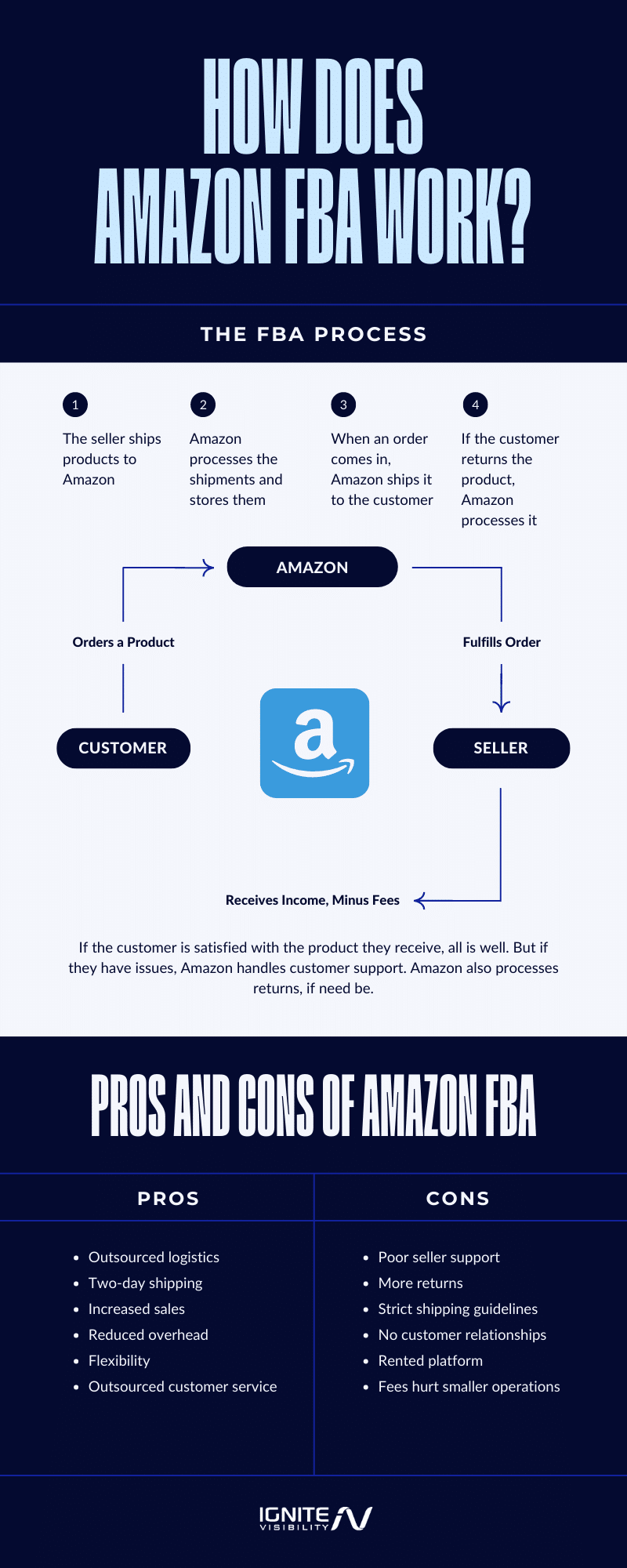
- Charts
- Explainers

- Quote Features

- Cover Images

How to Use Structured Data to Increase Visibility in the SERPS
These days, structured data is a key element in getting the most visibility in the search results.
Structured Data is a great way to increase the number of opportunities to boost your results organically.
Schema.org is a vocabulary made up of tags you can add to your website that helps Google organize information so they can (their words) display your content in “creative ways.”

Adding structured data can improve your results
While adding schema markup to your site is not an official ranking factor, it plays a role in helping your firm increase its visibility by providing the search engine with more context during indexing.
When optimizing your law firm’s website, you can start by just learning about the Local Business part of schema.org.
Specifically, pay attention to the “address” element. You’ll use that element to add your business address.
Again, you’re doing this to make it easy on Google to determine the location of your business.
There’s an important point here, though. It’s that you decide how you want your name and address to appear and stick to it everywhere you reference it.
For example: If your business is located at 123 Main Street, and you prefer to abbreviate “Street” with “St.”, then you must list your business that way online all the time. Otherwise, you’re going to limit your chances of reaching the top of the search results.
Of course, there are numerous other Local Business elements that you’ll want to use as well (“email”, “legalName”, “telephone”, etc.). The more info you add, the more you’re telling Google about your business. That’s a good thing.
You can mark-up a whole range of things you’d like searchers to see from the SERPs, including reviews, contact information, the area your firm serves, or even your ethics policy. You can get the full list on the schema.org site. The list can be very helpful for SEO for law firms.
The main benefit of adding structured data to your site is that it allows you to let Google know that you’d like your content to be featured as a rich result. Rich results get more SERP real estate than any other front-page listing, which of course, likely leads to a boost in traffic.
Additionally, you may want to mark up FAQ pages or how-to content for an additional shot at appearing in the rich results.
Though this isn’t a hard and fast rule, Google seems to favor long-form content when it comes to rich results, as one longer piece tends to have more chances of answering multiple questions people are searching for.
Quick Schema to Add to Your Site
- Schema for your location
- Schema for your industry
- Schema for your reviews and aggregate schema for your service
- Schema for your logo
- Schema for your breadcrumbs
How Reviews Affect Your Law Firm’s Bank
Any business can benefit from positive reviews, but when people are searching for someone to handle their legal matters, the stakes are higher than say, taking a chance on a new clothing company or trying a new restaurant. That’s why you only want to implement the best practices.
Google also uses reviews as a ranking signal for rankings. That’s why you want plenty of positive reviews.

How do you get reviews? The answer is actually quite simple.
Ask for them.
Ask a satisfied client to leave a review on Google or sites like Avvo, Facebook, or Yelp. Make sure your web copy, blog content, and other communications link to a place to leave a review, so you’re not making it difficult for your clients to share positive feedback.
We should mention that you do need to be careful here. Tactics like paying for reviews, swapping reviews with other attorneys or asking employees to pose as clients will likely backfire in the long run.
Another thing worth mentioning is, you need to respond to your reviews, positive and negative alike.
Google’s ranking system places a lot of weight on reviews, taking responsiveness into account along with whatever star-rating customers give you. While this might seem difficult, especially in the case of receiving negative feedback, it is good for boosting law firm SEO.
How Google’s Helpful Content Update Affects Your Rankings
In August 2022, Google released the Helpful Content Update. One of their biggest yet, this update seeks to reward content putting people first, search engines second.
In other words, Google wants content to provide value to humans, not try to game their algorithm.
This is because Google’s found users don’t like content made just to boost traffic. It’s usually poorly written, stuffed with keywords, and only exists as a means to an end.
So instead, Google wants you to create pages that provide value. Think about your site from the visitor’s perspective, asking things like:
- “Would I trust this article? Does it seems like an expert wrote it?”
- “If I was researching this topic, would this tell me everything I need to know?”
- “Would I trust this site with my credit card info?”
- “Does my content have grammatical errors?”
- “Did someone spend time on this content, or did they just throw it together?”
- “Would I share this with my friends if they wanted to know more about the topic?”
But this emphasis on helpful content doesn’t negate technical SEO. technical SEO. In fact, Google sees technical SEO as crucial to maximizing user experience.
Crawlers don’t care about things like SSL or mobile friendliness, but users do. Their relevance to the user experience is why Google cares about them.
How to Use Video to Effectively Market Your Firm
We don’t need to say this again, but video content is still on the rise.
For law firms, it presents an opportunity to make a personal connection with potential clients and build trust before they decide to book a consultation.
It’s also another way to increase your chances of coming up in an organic search.
How Should You Use Video?
Well, the answer to this one is, you’ll use it for many of the same things you’re using your blog content for. Including the following:
- Answering common legal questions
- Giving viewers a behind the scenes view of your law firm.
- How-to content such as finding a lawyer,
- Giving short overviews on legal practice areas and what that entails.
- Client testimonial videos
As with any video strategy, there’s still room to get creative here.
Take a look at this Cautionary Tales playlist from Bryan Cave Leighton Paisner, who uses their YouTube to dramatize various legal issues and infractions. It can help you come up with a few ideas to boost SEO for your law firm.
Don’t Forget to Connect YouTube Content Back to Your Site
One thing you will need to think about if you plan on creating YouTube content is linking strategically from your YouTube account to your website.
YouTube, the second-largest search engine is the perfect place to pick up some organic links for law firm SEO. While YouTube links are nofollow, they do drive traffic.
Make sure you link to your website from your YouTube channel and go through your video library and link to the most relevant pages on your site. This could be anything from blog content to FAQs, service pages, or your About Us section.
Law Firm SEO FAQs
Here are the most common questions we get about SEO for law firms:
1. What Are Some Attorney Marketing Strategies?
Beyond law firm SEO, there are some attorney marketing strategies you should follow:
- Old-fashioned networking – Make sure you’re active in professional associations. For example, take clients out to lunch or dinner and attend networking events to meet new people in your field.
- A User-Friendly Website – You shouldn’t just make sure that your website is friendly to search engines, you should also ensure that it’s friendly to visitors. Include a menu that makes it easy to navigate around your site. Add social proof. Use a responsive design so it looks great on any device. Enhance the overall user experience to boost your conversion rate.
- Online advertising – Never underestimate the value of PPC. You can attract new clients with local search ads.
Email marketing – Maintain your relationship with clients by sending them emails every now and then.
2. Do I Need a Law Firm Marketing Blog?
If you’re serious about law firm SEO, you should add a blog to your website and update it regularly.
Why? Because content marketing is a great way to optimize your site for key search terms.
Use a tool like SEMRush to uncover some of the more popular keywords related to your law firm’s specialty. If you have more than one specialty, find keywords relevant to each one.
Then, produce helpful content optimized for those keywords. Make sure the content answers the kinds of questions you expect your clients to ask during initial consultations.
You’ll also demonstrate your knowledge about the law when you practice content marketing. That’s going to help attract more business as well.
3. Is Law Firm SEO Better Than PPC?
SEO vs. PPC isn’t really the best way to think about it.
Both methods are important to driving business and each represents a different piece of a broader marketing strategy.
See, optimizing your website for search helps you build credibility and over time, grow your organic traffic. It’s a way to prove value and show your audience that your firm can help clients win their next legal battle.
PPC allows you to bypass organic search results and appear in front of an audience you might not be able to reach otherwise. Use paid ads to boost your firm’s visibility, get in front of a new market, and present specific offers tied to a goal–be it conversions, lead generation, and so on.
Whether you’re a law firm or an e-commerce brand, it’s important to understand that you can’t pick one marketing strategy and call it a day. Today’s savviest firms know that marketing means optimizing for voice, fine-tuning their social presence, advertising on Google, and creating content that people actually want to read.
4. Can I Handle Law Firm SEO on My Own?
You can, but you probably shouldn’t.
That’s because law firm SEO is an ever-evolving discipline. The kinds of strategies that worked just a couple of years ago might not work anymore.
Digital marketing professionals keep up with those changes in best practices. They can make sure that your site is in tip-top shape consistently.
Firms can hire in-house pros or work with an agency to create content and optimize your website.
Either way, it’s probably your best bet to outsource SEO for your law firm, as you’ll have more time to focus on your clients and not what Google’s latest algorithm is doing to your search rankings.
5. How Long Should a Law Firm SEO Campaign Last?
SEO is a marathon, not a sprint. It’s a continuous effort of creating content, building links, and tweaking your website to build more quality traffic over time.
SEO is also constantly changing. Google algorithm updates, increased competition, and shifting industry trends all demand constant adjustments.
Stopping your SEO efforts even after you’ve reached your campaign goal can be costly. Especially in the high-stakes legal field, competitors will blow past you if you don’t keep improving.
So to answer, a law firm SEO campaign should never truly stop. SEO is a constant investment with a growing return on investment.
6. How Often Should I Post Articles on My Website?
There’s no set limit or minimum for how many blogs you should post monthly. You should post as much content as possible while maintaining a high quality standard.
To understand why, picture two identical law firms planning a month’s worth of content. Law Firm A plans to publish 10 high-quality articles, and Law Firm B wants to publish 30 low-effort articles.
After a few months, Law Firm A’s content will have built more traffic than Law Firm B’s. This is because Google rewards quality and punishes junk.
The Helpful Content Update emphasized providing user value over everything else. If your blogs provide value to readers, they’ll inevitably build traffic.
7. Does Link Buying Work?
Buying links directly might seem attractive since it can take years to rank for competitive terms. After all, if the links come from authoritative sites, what difference does it make how they got there?
The issue is buying links directly violates Google Webmaster Guidelines. If Google finds out you’re buying links, you might get a harsh penalty.
That said, Google isn’t all-knowing, and penalties aren’t as frequent as they used to be. These days, the biggest risk of buying links is getting ripped off.
Why? Because if a website sells you a link, they’re selling it to others.
And while Google doesn’t magically know when a link is paid for, it knows when a site links to others unnaturally. Google takes this as a cue not to trust the linking site, greatly reducing the weight it passes on.
But hiring a link-building expert is fine. Many companies hire people to build high-quality links by guest posting, being a source for journalists, and more.
Wrapping Up
Bottom line: SEO for law firms primarily falls into the realm of Local SEO (unless you work for a large national firm).
However, you should also focus on content marketing efforts, paid ads, and building a strong reputation online.
The legal services industry is competitive and edging out other firms in your niche means optimizing for local SEO, leveraging structured data, and creating content that answers the questions your audience is looking for.
Once you’ve put some effort into optimizing your website, you should see its rank improve over time. Keep in mind, good law firm SEO is like good wine: it takes time to achieve the desired result.
If you need help, contact us now.
